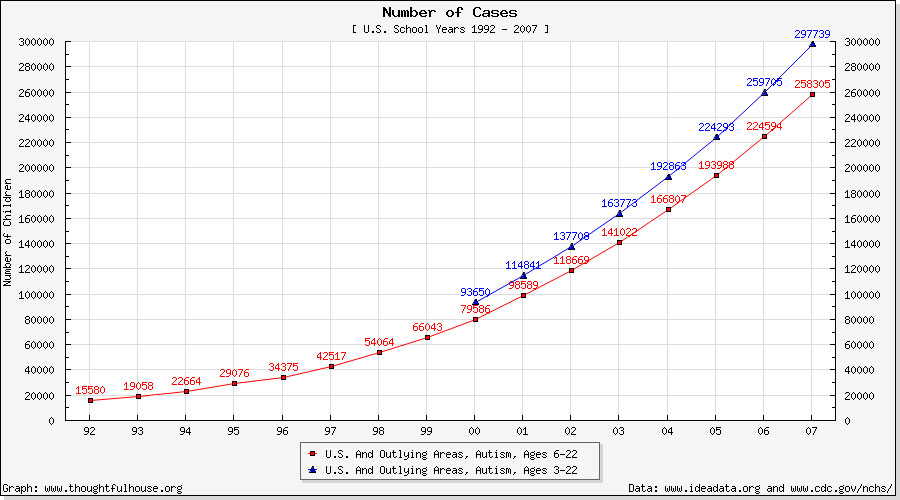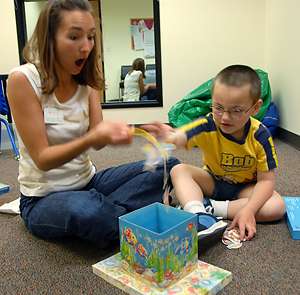

| Home |
| History Lesson |
| What is Autism? |
| What is the MMR Vaccine? |
| Is There a Link? |
| Just the Facts |
| What Parents Need to Know |
| Conclusion |
| References |
Why is there believed to be a link between autism and the MMR Vaccine? |
|
- Inaccurate and Biased Studies
- Misrepresented and Even Falsified Data
- Increased Autism Awareness and Medical Training
- Celebrity Endorsements and Hyped Media Attention
- Mixed Emotions and the Desire for Answers
Many must wonder why a debate over the link between autism and the MMR vaccine even exists if there is no scientific support or evidence to back it up. The strongest links between the two are mostly circumstantial, but because of controversy over other vaccines coupled with the news and other media, the MMR has become a popular scapegoat. The timeframe which includes the introduction of the MMR vaccine and an increase in the diagnosis of autism overlap very closely together. Before 1980, autism was diagnosed in just 1 out of every 10,000 children. Twenty-five years later, the National Institutes of Health reported that autism disorders affect one in every 250 children, and is estimated to increase 10% every year (Vaccinations and autism, 2005). As many of you may already know, thanks to recent commercial spots and celebrity faces, the current diagnoses rate is 1 out of every 150 children.
Inaccurate and Biased Studies
The controversy regarding the possible negative effects of the MMR vaccine and the link between it and the development of autism impacted the medical and scientific community with a 1998 research study done by a gastroenterologist named Dr. Andrew Wakefield. Observations in the study suggested a possibility that the MMR vaccine led to intestinal abnormalities, which resulted in not only impaired intestinal function but also developmental regression leading to disorders such as autism. Basically, Wakefield found that a lower GI of autistic patients showed differences when compared to a GI of child without the disorder. Because of its timing, with so many parents and medical professionals actively in search of answers about autism and potential causes, Wakefield’s study received a lot of high-profile coverage. Many parents began to quickly accept the link with the MMR vaccination and onset of autism being very closely connected time wise. Shortly after Wakefield’s study was made public, the television news program 60 minutes picked up the story and covered parent’s reaction to the connection between the MMR vaccine and autism. One segment of the television report included a visit to a conference of parents with autism. When the reporter asked who there believed their child’s autism was caused by the MMR vaccine, everyone had a hand in the air. The parents were hostile and openly welcomed an answer to why their child developed autism, and the acceptance of Wakefield’s study was rapid across the United States.
Misrepresented and Even Falsified Data
Since Wakefield’s findings were reported, his study was among many debatable studies included in a thorough evaluation conducted by the United Kingdom Medical Research Council (MRC), which concluded there was absolutely no connection between the MMR vaccine and autism. The MRC’s evaluation found that Wakefield’s study was not designed to investigate any findings related to developmental disorders such as autism, and that therefore the data was inaccurate (Schriebman, 2005). Since the MRC refuted Wakefield’s claims, most of the scientific and medical communities have agreed with the researchers findings. However, the MRC’s report did not make it to a primetime news program, and parents have not since been redirected. Medical doctors have since warned that even if there was a link such as Wakefield had claimed, the risk of prolonging the period before children are immunized against all three diseases in the MMR vaccine is greater than any credible risk of harm from combining them (MMR vaccine controversy, 2009). Still today, stories are coming out in the UK about how Wakefield may have falsified crucial portions of his study. Unfortuantely, the damage has already been done and as with newspapers, it's easier to catch the initial article than the retraction.
Increased Autism Awareness and Medical Training
Another notion people do not always consider is the case increase could merely be a result of doctors in the United States now being better trained and informed about autism from the 1980s to today. Many children were misdiagnosed with disorders other than autism or would simply go undiagnosed. Autism awareness in the United States has increased as quickly as the diagnosed cases of the disorder. Autism is a relatively new disorder, and was not even recognized or studied until beginning in the late 1930s (Fisher, 2006).
Below is a graph that covers the increase of autism cases reported in the United States from 1992-2007 and based on school age enrollment. The graph is compiled by the FightingAutism organization which relies on very specific data sources including the U.S. department of Education and Office of Special Education Programs (OSEP) in accordance with Section 618 of Individual with Disabilities Education Act (IDEA). When someone only looks at the numbers, and does not consider the information surrounding them, then it is obvious why more parents today may feel panic concerning the increased chances of their child being diagnosed with autism (FightingAutism, 2007). What this chart does not include is the increase in autism awareness or the number of doctors that have been better trained to diagnose autism in as many years.
Celebrity Endorsements and Hyped Media Attention
Despite there being no confirmed risk scientifically or medically, the news and other media such as television talk shows and dramas have been hasty with their stance on the matter. As Vincent Iannelli, M.D. reports on his About.com Pediatrics Blog, the media “will even parade celebrity ‘experts’ on their shows, who may influence a parent’s decision on whether or not to immunize their own kids, even though the experts have no expertise in pediatric infectious disease.” Iannelli believes that the media is being irresponsible and needs to be including the risks and consequences of delaying or not vaccinating their children with important vaccines such as MMR (Iannelli, 2008). One celebrity “expert’ that Iannelli may have had in mind is Jenny McCarthy. In May 2007, McCarthy announced that her son was diagnosed with autism in 2005. McCarthy served as a spokesperson for Talk About Curing Autism (TACA) from June 2007 until October 2008. Her duties included public fundraisers and online chats which put her out there with other parents who had children with autism. After publishing her second book on autism, Mother Warriors: A Nation Of Parents Healing Autism Against All Odds, McCarthy made an appearance on The Oprah Winfrey Show in the Spring of 2008, and her story became very well-publicized. On the show, McCarthy told Oprah that her son was developing normally up until he received his MMR vaccine at 15 months, and she knew in her heart that it was the cause of his autism. McCarthy’s claims have been harshly criticized by doctors and scientists, but because of her celebrity status and her appearances on high-profile talk shows such as Oprah, parents have readily accepted McCarthy’s opinions. Additionally, McCarthy’s boyfriend, actor Jim Carey, has offered his support to McCarthy and joined her for public appearances. McCarthy’s findings and claims have been refuted by the scientific and medical community because she backs her claims with no sound scientific studies or evidence. McCarthy’s claims have up to now been solely based on observations of her own son and shared stories with other parents of children with autism. Because of her high-profile status and the success of her books on autism, McCarthy has successfully fueled the fear and confusion over childhood vaccines while failing to report both sides of the issue or providing any scientific or medical support to her claims.
Mixed Emotions and the Desire for Answers
Parents, the medical and the scientific community are alarmed by the increasing rate of autism diagnoses and are desperate for answers. Parents of an autistic child need comfort and to know that t is not anything they specifically did wrong when it comes to the health of their children. They want answers and many members of the medical and scientific communities are just as eager when it comes to trying to provide them with those answers.
|
||

